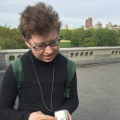You have no items in your cart. Want to get some nice things?
Go shoppingI first saw him on my seventh day on the job. I remember because my boss ordered me to chop off my hair the day before, and the spring breeze was whispering through my hair and giving me goose bumps. Cherry blossoms were shattered across the pavement. I was running in my Armani suit—I forget why, something about the air made me feel late—and as I rounded the corner to sprint through the doors I saw this clown standing next to them.

He barely reached over the rim of the ashtray-trashcan, and I almost ran past him were it not for his wig. It towered a good two feet over his head. I stopped, tripped straight into the door, and stumbled backward into the air, managing to stop myself from teetering over the stairs by flailing my arms about. And as I regained myself, feeling the ground secure itself through my shoes, the clown looked at me—pointed his finger—and laughed.
But it wasn’t really a laugh. It was more like an ambulance siren than a laugh, all shrill and constant and loud, going “Ha ha ha” in a computer’s perfect monotone. Then it stopped, and he lowered his hand, and his mouth became still again.
I looked around me, scanning the busy street corner for some eyeballs, some stares, a pause in the steady pounding of pavement and heels. No one seemed to notice. I was shoved aside by an enormous handbag attached to a woman in heels. They both gazed at the clown as if in their sleep, and pushed their way into the lobby like a conveyer belt through an assembly line.
The clown neglected to laugh at them.
I adjusted the reassuring strap of my bag on my shoulder, swiped my nonexistent hair out of my eyes, and walked up to the clown a few inches from his face. He made no notice of noticing me, his eyes a placid lake of blue and gray, nothing moving beneath but blood and eye juice. I waved my hand in front of his face. Not even a flicker of interest moved his mouth, the greasepaint hiding any deepening of the lines that may have occurred. A rage hit me, dazing me so that I gritted my teeth and clenched my fists.
No one was paying us the least attention, and as the clown continued to gaze through me I forgot who I was and what I was doing for a second. And I laughed. It was a low, deep growl of a laugh, but a laugh just the same, and it rolled across my tongue like the cogwheels in a rusted machine. The clown still didn’t flicker. Grabbing my bag to my chest I marched past him into the lobby, wishing I could have flicked my hair, a horse’s tail, irritated by a fly.
The next time I saw the clown I was ready for him. I remember because my boss had told me to stop painting my nails with clear polish the day before, and so my nails were naked that day to the mist of the spring rain coming down between the skyscrapers’ watch. I saw him as I rounded the corner, not running but coming at him at a steady pace. He was at his post by the door, not looking at anyone but seeming to see everything regardless. As I came toward him I reached out my hand, and in a firm voice, I said:
“Hello. My name is unimportant, and I work in the commercial lending department of a multinational bank. I graduated top of my class at Harvard. I make more than you could possibly imagine. Pleased to meet you.”
This time, the clown didn’t laugh. As I held out my hand, waiting for him to grip it or spit on it, I saw a thick, oily tear reach its way over his eyelashes and slide down his greasepainted cheek. It trembled on his chin, mingling with the mist of the rain, and splattered onto his pinstriped lapel, splayed across the fabric like a bomb victim. And he started to cry.
“What—what’s the matter with you?” I said, being jostled in the ribs by a coffee cup attached to a man in a trench coat. They walked past us, shoved their way through the doors with a guttural grunt as they slurped at their latte. The clown continued to sob, a shrill, constant, and loud wail—not like a mourner but like an alarm—and the tears glistened in his greasepaint like so many bullets. I lowered my hand, opened my mouth, flailed about for words, numbers, anything to stop the sound no one else seemed to hear. But I could think of nothing, and soon I was sobbing too, thick, oily sobs that dribbled from my throat into the mist obscuring everyone’s face but the clown’s.
“I’m sorry I’m so ridiculous,” I said.
The clown reached out his hand, gripped my lapel, and with round eyes, he said:
“You should be.” And to the sound of the rain, the doors opened, and the doors shut, and the clown laughed.

Alex Archer
Alex Archer is a freelance short story writer and poet from Los Angeles, California. Their work has appeared in Offcourse. They attend Temple University in Philadelphia, Pennsylvania, where they are helping to start an undergraduate writers’ collective. They currently lives in (and wanders around in) Philadelphia with their camera. Their work has been exhibited at the Philadelphia Photo Arts Center and the William Way LGBT Center. They have also lived in Bristol, England.




